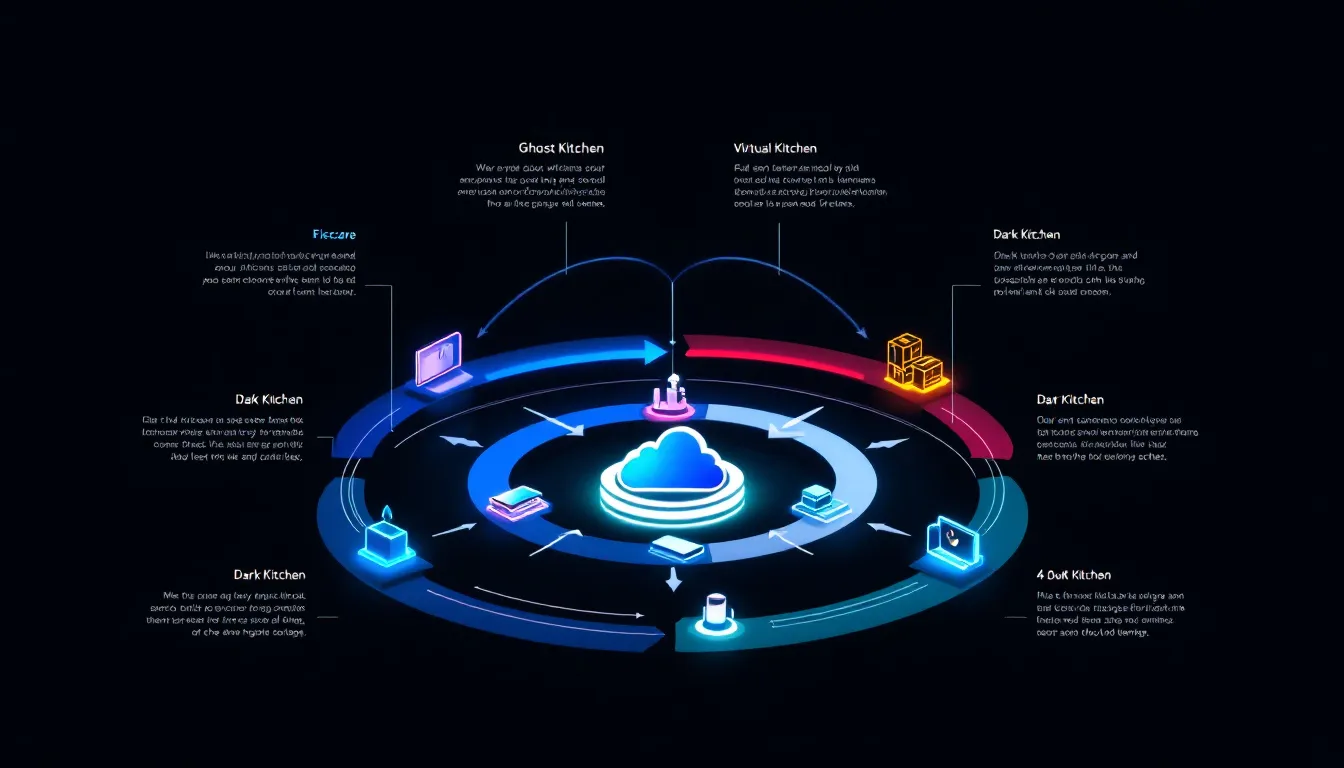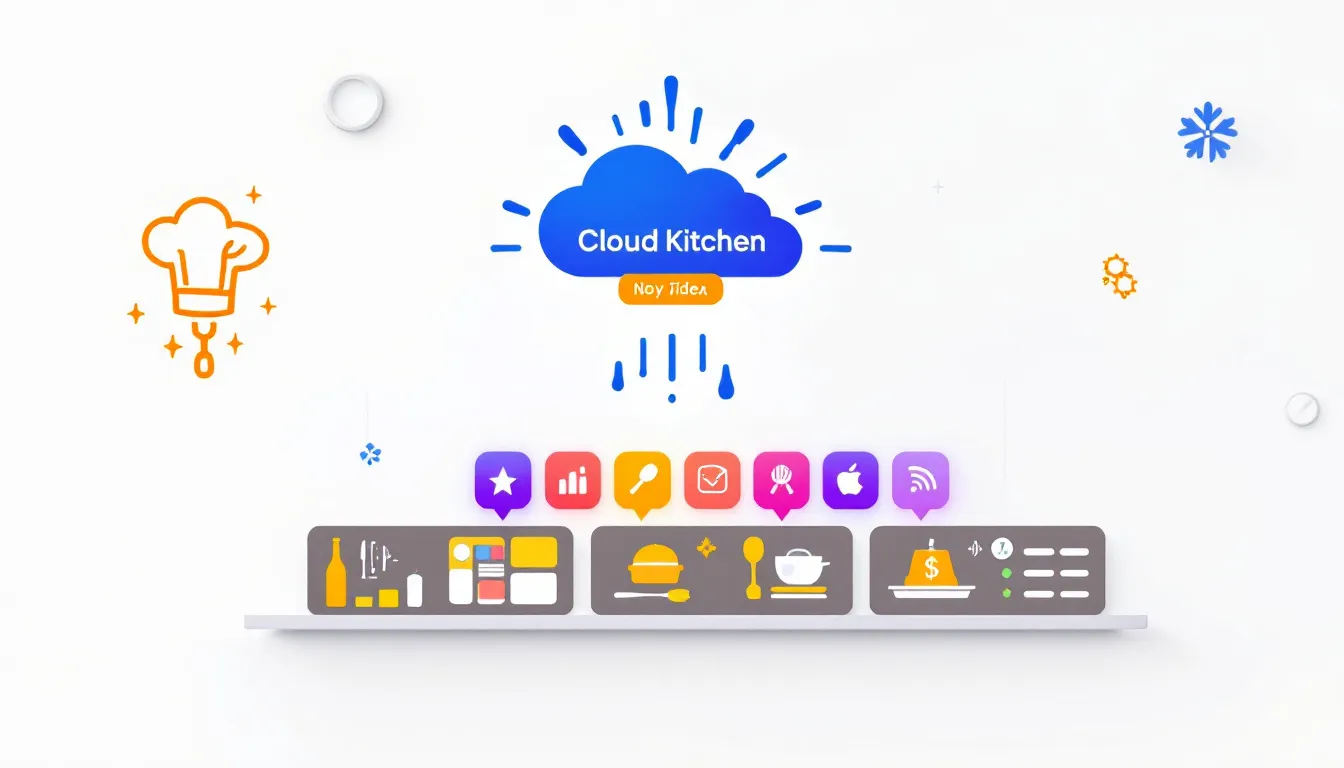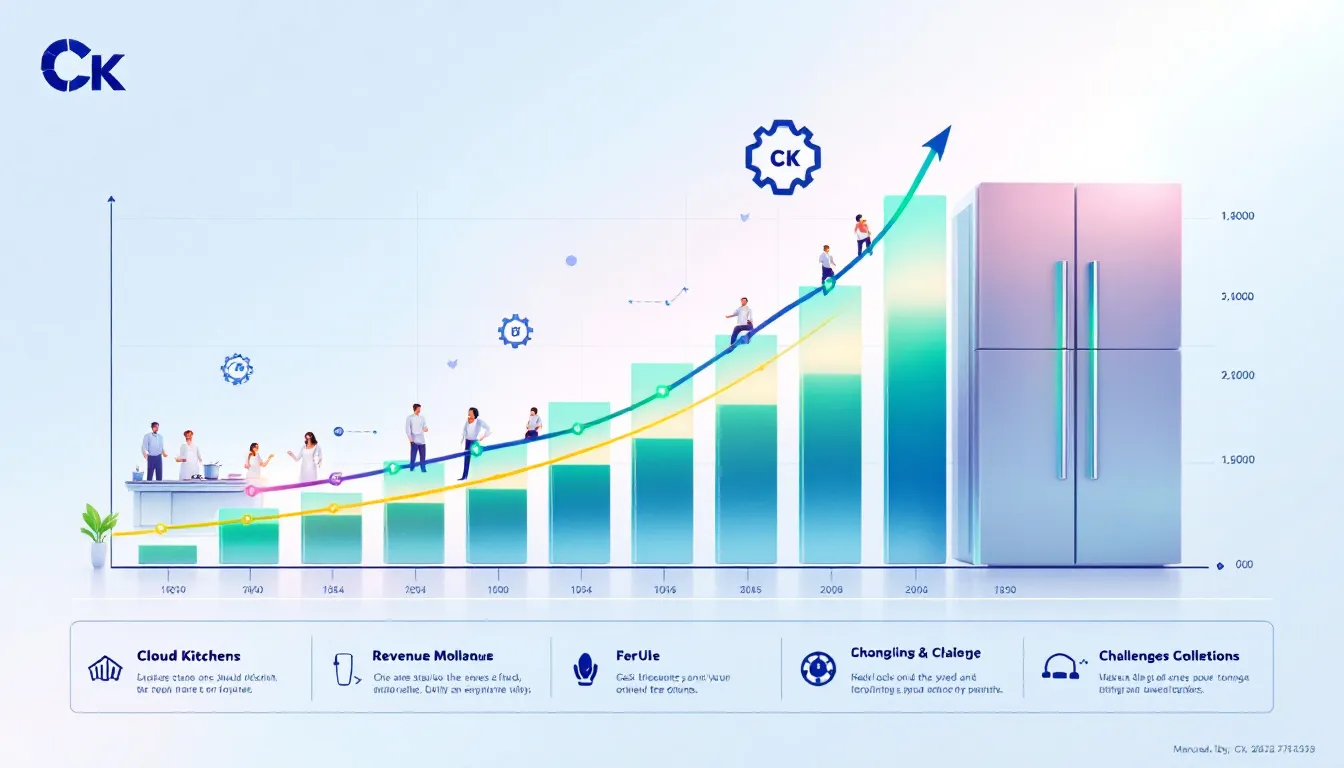Wondering how to start cloud kitchen? This guide will help you with that. You will learn how to research the market, pick the right kitchen model, find a good location, get all the needed licenses, and set up online ordering systems. By the end, you’ll understand the key steps to start your cloud kitchen successfully.
Embarking on the journey of starting a cloud kitchen is not just about cooking; it’s about crafting an entire business model that thrives in the digital age. The concept of cloud kitchens, also known as dark kitchens or ghost kitchens, has been gaining immense popularity worldwide, especially in India, where the food delivery market is booming. These kitchens operate without a traditional dine-in space, focusing solely on preparing food for delivery through online platforms.
Before jumping into the cloud kitchen business, it’s crucial to have a solid project report. This document is your roadmap, guiding you through financial planning, attracting investors, and ensuring smooth business execution.
This guide will show you how to create a comprehensive project report and explain why it’s crucial for your success.

Definition: A cloud kitchen, also known as a delivery-only kitchen, is a commercial kitchen space that focuses exclusively on preparing food for delivery and takeaway orders, without offering dine-in services.
Digital Integration: Unlike traditional restaurants, cloud kitchens leverage digital platforms and delivery services to cater to the growing demand for online food delivery.
Cost Efficiency: This innovative model allows food entrepreneurs to minimize overhead costs and maximize efficiency by eliminating the need for a physical dining area.
Business Models: Cloud kitchens operate on various models, including single brand cloud kitchens, which focus on one brand and menu, and multi-brand cloud kitchens, which house multiple brands under one roof, sharing kitchen space and resources to reduce costs.
Virtual Restaurants: The cloud kitchen business model also includes virtual restaurants, where brands exist solely online, offering diverse cuisines without a physical storefront, making them highly adaptable to market trends and customer preferences.
Industry Impact: The cloud kitchen concept is revolutionizing the food industry by providing flexibility, scalability, and cost-effectiveness.
Market Reach: With the rise of food delivery platforms like Zomato and Swiggy, cloud kitchens can reach a broader audience without the limitations of a physical location.
A well-crafted project report is vital for any successful cloud kitchen business. Here’s why:

Starting a successful cloud kitchen business requires thorough research and meticulous planning. Here are the key steps to get started:

Choosing the right cloud kitchen model is pivotal for your business’s success. There are several models to consider, including standalone, multi-brand, and virtual restaurants. Each model offers unique advantages and operational needs.
A standalone cloud kitchen operates under a single brand, requiring around 300 square feet and a small team of 4-5 people. This model allows for complete control over operations but requires a higher initial investment compared to shared kitchens.
On the other hand, a multi-brand cloud kitchen significantly reduces costs by enabling multiple brands to share kitchen resources, thus optimizing kitchen space and equipment usage.
Virtual restaurants, which exist solely online, offer flexibility and adaptability to market trends without the need for a physical storefront. A virtual restaurant delivery app-owned kitchen and fully outsourced kitchens are other viable options, each catering to different business strategies and investment capacities.
Understanding the pros and cons of each cloud kitchen model will help you choose the one that aligns best with your business goals and resources.
GST Registration: Register for GST to comply with tax regulations and enable your business to operate legally within the cloud kitchen industry.
A robust marketing strategy is crucial for thriving in the competitive cloud kitchen market. Consider the following key points to enhance your marketing efforts:
When starting a successful cloud kitchen business, investing in the right plant and machinery is crucial to ensure efficient operations and maintain food safety standards. Here’s a breakdown of the essential equipment you’ll need:
By equipping your cloud kitchen with the necessary plant and machinery, you can ensure efficient operations, maintain high food safety standards, and deliver delicious meals to your customers. Investing in quality equipment will contribute to the long-term success and profitability of business.
Sourcing quality kitchen equipment and ingredients is vital for ensuring food safety and delivering delicious meals. Invest in commercial-grade kitchen equipment such as refrigerators, microwaves, and food storage containers to maintain efficiency and hygiene in your cloud kitchen. Reliable kitchen equipment is crucial for the smooth operation of your delivery-only kitchen.
To ensure a steady supply of high-quality ingredients, it’s important to build strong relationships with reliable vendors. Additionally, opting for bulk purchases can further enhance this supply. Engaging with local farmers or specialty suppliers can enhance the freshness and quality of your ingredients, contributing to better food business offerings.
Prioritizing quality in both equipment and ingredients will help you maintain high food safety standards and deliver exceptional meals to your customers.

Setting up efficient online food ordering and delivery systems is crucial for the success of your cloud kitchen business. An efficient online ordering system streamlines order processing and enhances the customer experience. Leverage technology and data analytics to optimize operations, manage orders through a single device, and integrate delivery platforms for streamlined operations.
Collaborate with established food delivery apps like Swiggy, Zomato, and Foodpanda to expand your order reach and efficiency. Effective order fulfillment strategies include identifying delivery areas and optimizing kitchen locations to be close to high-demand regions.
By focusing on efficient online ordering and delivery systems, you can ensure timely deliveries and a positive customer experience.
Skilled chefs and staff are essential for maintaining high food quality and ensuring customer satisfaction. The caliber of your chefs significantly influences the quality of your food and the overall customer experience. Professional chefs can manage kitchen operations efficiently, contributing to faster order fulfillment and innovative menu development.
Proper training on hygiene and best practices ensures staff can maintain food safety standards and deliver excellent customer service. Communicating brand vision and expectations effectively is crucial when hiring chefs for cloud kitchens.
Investing in skilled chefs and staff will help you deliver consistently high-quality meals and attract repeat customers.
A strategic marketing plan is crucial for the success of your cloud kitchen business. Conduct thorough market research to understand customer preferences and market trends. Creating a unique brand identity helps your cloud kitchen stand out in a competitive market, attracting health-conscious and environmentally conscious customers.
Effective customer acquisition and retention strategies are essential for ensuring business success. Use food delivery platforms and digital marketing initiatives to capture customer data for better targeting. Regular promotions, discounts, and bundle deals can entice new customers and encourage repeat orders.
Engage with local communities through social media and events to enhance brand loyalty and customer retention. A strong online presence is vital for attracting and retaining customers. By developing a strategic marketing plan, you can ensure that your marketing efforts align with your business objectives and contribute to a sustainable, profitable venture.
Effective financial management and inventory control are vital for running a successful cloud kitchen business. Implementing a budget helps monitor expenses and aids in making informed financial decisions throughout the operational process. Maintaining accurate and detailed records of sales and expenses is crucial for analyzing financial performance and preparing tax filings. Key financial metrics like profit margins, cost of goods sold, and return on investment help evaluate your cloud kitchen’s performance and profitability.
Inventory management software can significantly improve tracking and reduce food waste in cloud kitchens. Regularly reviewing and adjusting pricing strategies based on market trends can help optimize profitability. A clear pricing model that reflects ingredient costs and labor ensures the sustainability of your cloud kitchen business.
Efficient financial and inventory management will enable you to run your business effectively and maximize profits.
Ensuring food safety and maintaining high-quality standards are paramount in the cloud kitchen business. Obtaining an FSSAI license is crucial for compliance and establishing credibility with customers. Cloud kitchens must ensure their infrastructure meets hygiene and safety standards as part of the FSSAI licensing requirements. Implementing a detailed cleaning schedule and regular sanitization of kitchen surfaces and utensils are essential to eliminate bacterial growth and maintain hygiene.
Effective food storage practices help avoid cross-contamination and ensure food freshness. Proper waste management is vital to prevent attracting pests and maintaining a clean kitchen environment.
Using standardized recipes helps ensure that food quality remains consistent across different staff members and shifts. Focusing on food safety and quality control ensures you deliver high-quality meals that meet customer expectations and build a loyal customer base.
Streamlining operations is vital for the efficiency and growth of your cloud kitchen business. Regularly evaluate your operations, including menu items, kitchen setup, and staff efficiency, to spot improvement opportunities. Efficient kitchen workflows can minimize errors and wait times, enhancing the overall dining experience for customers.
Technology can automate repetitive tasks, increasing operational efficiency and allowing staff to focus on more complex responsibilities. Regular data analysis, including tracking sales and customer feedback, guides menu adjustments and enhances overall business strategies.
Streamlining your operations will help you lower overhead costs, run your business effectively, and position yourself for future expansion.
A comprehensive project report is essential for the success of your cloud kitchen business. The report should detail essential aspects such as the proposed location, estimated costs, and financing options. Outline the menu items that will be offered, ensuring they align with market demand and customer preferences.
Including a growth potential analysis in the project report is crucial, as cloud kitchens benefit from the rising trend of online food delivery. The financial part of the report should encompass startup capital, operational costs, and projected sales turnover. Including a break-even analysis can help potential investors understand how long it will take for the kitchen to become profitable.
A well-prepared project report guides business execution and attracts investors, securing funding.

Cloud kitchens can be highly profitable ventures. Earnings can reach around 1.5 lakh per month if handling 40-50 orders daily at an average profit of 100 rupees per order. Profitability largely relies on the volume of orders; processing 25-50 orders a day can yield profits of 2-4 lakhs monthly.
Despite the low initial investment required, high fees charged by delivery platforms can significantly eat into profits. Margins for cloud kitchens can range from 0-10%, heavily influenced by commissions from platforms like Swiggy and Zomato.
Effective marketing and customer engagement are vital, as cloud kitchens often lack direct customer interaction, making brand recall a challenge. Most cloud kitchen operators do not maintain a customer database, which limits repeat business and brand loyalty. Focusing on these aspects maximizes profitability and builds a successful cloud kitchen business.
Running a cloud kitchen from home is feasible if you meet the necessary legal and regulatory requirements. A home-based cloud kitchen can significantly lower startup expenses by eliminating the need for commercial real estate. Home kitchens must comply with health and safety standards to ensure food safety.
Operating from home offers the flexibility of leveraging existing kitchen space and equipment. However, it’s essential to check zoning laws and local regulations to confirm that a home kitchen is suitable for food preparation.
Partnerships with food delivery platforms can help expand customer reach for a cloud kitchen operating from home. With the right approach, a home-based cloud kitchen can be a successful and cost-effective venture.
Starting a cloud kitchen is an exciting and profitable venture in today’s digital age. From understanding the cloud kitchen concept to selecting the right model and setting up efficient operations, each step is crucial for success. A comprehensive project report, thorough market research, and a strategic marketing plan are essential components of a successful cloud kitchen business.
By focusing on food safety, quality control, and efficient financial management, you can ensure the sustainability and profitability of your cloud kitchen. Whether you choose to operate from a commercial space or your home, the potential for growth and success is immense. Now is the perfect time to take the plunge and start your own cloud kitchen business – the future of food delivery is waiting for you!
A cloud kitchen is a delivery-only kitchen that specializes in preparing meals for takeout, allowing for a streamlined focus on food delivery without the need for a dine-in space. Embrace this innovative model to tap into the growing demand for convenient dining options!
Absolutely, a project report is crucial for launching your cloud kitchen as it helps in financial planning, attracts investors, and provides a clear roadmap for your business. So, get started on that report to pave the way for your success!
To start a cloud kitchen in India, you’ll need an FSSAI license along with potential permits for fire safety, health, and pollution control based on your operations’ scale. Take these steps, and you’re on your way to success!
A cloud kitchen business can be highly profitable, potentially earning around 1.5 lakh per month with efficient order management and marketing. Focus on driving orders and managing costs to unlock your business’s full potential!
Absolutely, you can run a cloud kitchen from home! Just ensure you follow the necessary legal requirements, health standards, and local zoning laws to get started successfully.
This article may contain affiliate links, which means we may earn a small commission at no extra cost to you if you make a purchase through these links. We only recommend products and services that we genuinely believe will provide value to our readers. Your support through these links helps us continue to provide quality content. Thank you for your support!
Investing in our project report is a strategic move for anyone looking to establish a successful cloud kitchen business. Here’s why:
By purchasing our project report, you’re equipping yourself with the knowledge and tools necessary to navigate the competitive cloud kitchen industry and achieve your business objectives effectively.